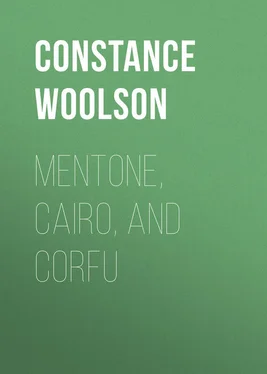Constance Woolson - Mentone, Cairo, and Corfu
Здесь есть возможность читать онлайн «Constance Woolson - Mentone, Cairo, and Corfu» — ознакомительный отрывок электронной книги совершенно бесплатно, а после прочтения отрывка купить полную версию. В некоторых случаях можно слушать аудио, скачать через торрент в формате fb2 и присутствует краткое содержание. ISBN: , Жанр: foreign_prose, на английском языке. Описание произведения, (предисловие) а так же отзывы посетителей доступны на портале библиотеки ЛибКат.
- Название:Mentone, Cairo, and Corfu
- Автор:
- Жанр:
- Год:неизвестен
- ISBN:http://www.gutenberg.org/ebooks/33367
- Рейтинг книги:4 / 5. Голосов: 1
-
Избранное:Добавить в избранное
- Отзывы:
-
Ваша оценка:
- 80
- 1
- 2
- 3
- 4
- 5
Mentone, Cairo, and Corfu: краткое содержание, описание и аннотация
Предлагаем к чтению аннотацию, описание, краткое содержание или предисловие (зависит от того, что написал сам автор книги «Mentone, Cairo, and Corfu»). Если вы не нашли необходимую информацию о книге — напишите в комментариях, мы постараемся отыскать её.
Mentone, Cairo, and Corfu — читать онлайн ознакомительный отрывок
Ниже представлен текст книги, разбитый по страницам. Система сохранения места последней прочитанной страницы, позволяет с удобством читать онлайн бесплатно книгу «Mentone, Cairo, and Corfu», без необходимости каждый раз заново искать на чём Вы остановились. Поставьте закладку, и сможете в любой момент перейти на страницу, на которой закончили чтение.
Интервал:
Закладка:
"Certainly," I said, with my usual unappreciated benevolence.
"I wonder what induced these people to build their houses upon such a crag as this, when they had the whole sunny coast to choose from?" said Janet.
The Professor, charmed with this idle little speech (which he took for a thirst for knowledge), hastened by several of us as we walked in single file, in order to be nearer to the questioner.
"You may not be aware, Miss Trescott," he began (she was still in advance, but he hoped to make up the distance), "that this whole shore, called the Riviera – "
"Let us begin fairly," I said. "What is the Riviera?"
"It is heaven," said Mrs. Clary.
"It is the coast of the Gulf of Genoa," said the Professor, "extending both eastward and westward from the city of that name. On the west it extends geographically to Nice; but Cannes and Antibes are generally included. This shore-line, then, has been subject from a very early date to attacks from the pirates of the Mediterranean, who swept down upon the coast and carried off as slaves all who came in their way. To escape the horrors of this slavery the inhabitants chose situations like this steep hill-side, and crowded their stone dwellings closely together so that they formed continuous walls, which were often joined also by arched bridges, like these above us now, and connected by dark and winding passageways below, so that escape was easy and pursuit impossible. It was a veritable – "
"Rabbit-warren," suggested Baker.
Inness made no suggestions; he was next to the Professor, and fully occupied in blocking, with apparent entire unconsciousness, all his efforts to pass and join Janet.
The Professor, not accepting, however, the rabbit-warren, continued: "As recently as 1830, Miss Trescott, when the French took possession of Algiers, they found there thousands of miserable Christian slaves, natives of this northern shore, who had been seized on the coast or taken from their fishing-boats at sea. There are men now living in Mentone who in their youth spent years as slaves in Tunis and Algiers. These pirates, these scourges of the Mediterranean, were Saracens, and – "
"Saracens!" said Janet, with an accent of admiration; "what a lovely word it is! What visions of romance and adventure it brings up, especially when spelled with two r's, so as to be Sarrasins! It is even better than Paynim."
I could not see how the Professor took this, because we were now all entirely in the dark, groping our way along a passage which apparently led through cellars.
"We are in an impasse , or blind passage," called Mrs. Clary from behind; "we had better go back."
Hearing this, we all retraced our steps – at least, we supposed we did. But when we reached comparative daylight again we found that Janet, Inness, and Baker were not with us; they had found a way through that impasse , although we could not, and were sitting high above us on a white wall in the sunshine, when, breathless, we at last emerged from the labyrinth and discovered them.
"That looks like a cemetery," said Mrs. Trescott, disapprovingly, disentangling her lace shawl from a bush. "You said it was a castle." She addressed the Professor, and with some asperity; she did not like cemeteries.
"It was the castle," explained our learned guide; "the castle erected in 1502, by one of the Princes, upon the site of a still earlier one, built in 1250."
"That Prince used the ruins of his ancestors as his descendants afterwards used his," observed Margaret, referring to the mansion in the street below.
"Possibly," said the Professor. He never gave Margaret more than a possibility; although a man of hyphens and semicolons, he generally dismissed her with an early period. "These old arches and buttresses," he continued, turning to Mrs. Trescott, "were once part of the castle. Turreted walls extended from here down to the sea."
"What they did once, of course I do not know," said Mrs. Trescott, implacably, "but now they plainly enclose a cemetery. Janet! Janet! come down! we are going back." And she turned to descend.
"The cemetery is a lovely spot," said Mrs. Clary, as we lingered a moment looking at the white marble crosses gleaming above us, outlined against the blue sky.
"Some other time," I answered, following Mrs. Trescott. For the quiet, lovely gardens where we lay our dead had too strong an attraction for Margaret already. She was fond of lingering amid their perfume and their silence, and she sought this one the next day, and afterwards often went there. It was a peculiar little cemetery, alone on the height, and walled like a fortress; but it was beautiful in its way, lifted up against the sky and overlooking the sea. On the eastern edge was a monument, the seated figure of a woman with her hands gently clasped, her eyes gazing over the water; the face was lovely, and not idealized – the face of a woman, not an angel. Margaret took a fancy to this white watcher on the height, and often stole away to look at the sunset, seated near it. I think she identified its loneliness somewhat with herself.
We went through the labyrinth again, but by another route, not quite so dark and piratical, although equally narrow. Miss Graves liked nothing she saw, but walked on unmoved, save that at intervals she observed that it was "deathly cold" in these "stony lanes," and " must be unhealthy." Mrs. Clary's assertion that the people looked remarkably vigorous only called out a shake of the head; Miss Graves was set upon "fever." It was amusing to see how carefully all the houses were numbered, up and down these break-neck little streets, through the narrowest burrows, and under the darkest arches. Here and there some citizen wealthier than his neighbors had painted his section of front in bright pink or yellow, and perhaps adorned his Madonna in her little shrine over the door with new robes, those broadly contrasted blues and reds of Italy, which American eyes must learn by gradual education to admire; or, if not by education, then by residence; for he will find himself liking them naturally after a while, as a relief from the unchanging white light of the Italian day. We came down by way of the square or piazza on the hill-side, to and from which broad flights of steps ascend and descend. Here are the two churches of St. Michael and the White Penitents, whose campaniles, with that of the Black Penitents beyond, make the "three spires of Mentone," which stand out so picturesquely one above the other, visible in profile far to the east and the west on the sharp angle of the hill.
"The different use of the same word in different languages is droll," said Margaret. "French writers almost always speak of these little country church-spires as 'coquettes.'"
"There is a Turkish lance here somewhere," said Inness, emerging unexpectedly from what I had thought was a cellar. "It is in one of these churches. It was taken at the battle of Lepanto, and is a 'glorious relic.' We must see it."
"No," said Janet, appearing with Baker at the top of a flight of steps which I had supposed was the back entrance of a private house, "we will not see it, but imagine it. I want to go homeward by the Rue Longue."
"Now, Janet, if you mean those dancing-dogs – " began Mrs. Trescott.
"I had forgotten their very existence, mamma. I was thinking of something quite different." Here she turned towards the Professor. "I was hoping that Professor Mackenzie would feel like telling me something of Mentone in the past, as we walk through that quaint old street."
"He feels like it – feels like it day and night," said Baker to Inness, behind me. "He's a perfect statistics Niagara."
"Look at him now, gorged with joy!" said Inness, indignantly. "But I'll floor him yet, and on his own ground, too. I'll study up, and then we'll see!"
Читать дальшеИнтервал:
Закладка:
Похожие книги на «Mentone, Cairo, and Corfu»
Представляем Вашему вниманию похожие книги на «Mentone, Cairo, and Corfu» списком для выбора. Мы отобрали схожую по названию и смыслу литературу в надежде предоставить читателям больше вариантов отыскать новые, интересные, ещё непрочитанные произведения.
Обсуждение, отзывы о книге «Mentone, Cairo, and Corfu» и просто собственные мнения читателей. Оставьте ваши комментарии, напишите, что Вы думаете о произведении, его смысле или главных героях. Укажите что конкретно понравилось, а что нет, и почему Вы так считаете.












